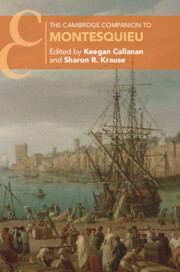Book contents
- The Cambridge Companion to Montesquieu
- Other Volumes in the Series of Cambridge Companions
- The Cambridge Companion to Montesquieu
- Copyright page
- Contents
- Contributors
- Acknowledgments
- Chronology
- Abbreviations
- 1 Montesquieu
- 2 Persian Letters
- 3 Considerations on the Romans
- 4 The Spirit of the Laws
- 5 Montesquieu and the Classical World
- 6 Montesquieu’s Guiding Principles and Foundations
- 7 Montesquieu on Virtue
- 8 Internationalism, Cosmopolitanism, and Empires
- 9 Liberty in Montesquieu
- 10 Political Sovereignty in Montesquieu
- 11 Montesquieu on Slavery
- 12 Montesquieu and the Liberty of Women
- 13 Political Economy
- 14 Religion and Politics
- 15 Constitutional History
- 16 Montesquieu and the Enlightenment
- 17 Montesquieu’s Liberal Legacies
- Bibliography
- Index
- Other Volumes in the Series of Cambridge Companions
8 - Internationalism, Cosmopolitanism, and Empires
Published online by Cambridge University Press: 23 February 2023
- The Cambridge Companion to Montesquieu
- Other Volumes in the Series of Cambridge Companions
- The Cambridge Companion to Montesquieu
- Copyright page
- Contents
- Contributors
- Acknowledgments
- Chronology
- Abbreviations
- 1 Montesquieu
- 2 Persian Letters
- 3 Considerations on the Romans
- 4 The Spirit of the Laws
- 5 Montesquieu and the Classical World
- 6 Montesquieu’s Guiding Principles and Foundations
- 7 Montesquieu on Virtue
- 8 Internationalism, Cosmopolitanism, and Empires
- 9 Liberty in Montesquieu
- 10 Political Sovereignty in Montesquieu
- 11 Montesquieu on Slavery
- 12 Montesquieu and the Liberty of Women
- 13 Political Economy
- 14 Religion and Politics
- 15 Constitutional History
- 16 Montesquieu and the Enlightenment
- 17 Montesquieu’s Liberal Legacies
- Bibliography
- Index
- Other Volumes in the Series of Cambridge Companions
Summary
In Chapter 8, the volume turns to the international dimensions of Montesquieu’s ethical and political thought. We can identify Montesquieu with the cosmopolitan and internationalist vision of the Enlightenment, anchored in the ideal of a common, rational outlook. Yet he understood that this aspiration came with coercion and cost. Universal rationality pushed against the expectation that each people and regime was rooted in particular mores, manners, and dispositions. The costs of cosmopolitan detachment are stamped on the figures of Usbek and Roxanne in Persian Letters, and they are evident in his praise of six “good enough” empires in The Spirit of the Laws. Despite a deserved reputation as a critic of colonialism, Montesquieu’s work also suggests justifications for empire on grounds of survival and sustenance, international security, human rights, the spread of science and enlightenment, and finally, doux commerce, whose global ambitions Montesquieu discerned but never with the naïve, coercionless expectations some readers erroneously drew from his work.
Keywords
- Type
- Chapter
- Information
- The Cambridge Companion to Montesquieu , pp. 130 - 146Publisher: Cambridge University PressPrint publication year: 2023
- 1
- Cited by

